What we know happened at Noah’s Park; why it happened is hard to explain
Goshen. Case dismissed, but terminally ill Noah’s Park owner has little hope of reuniting with her allegedly neglected animals.
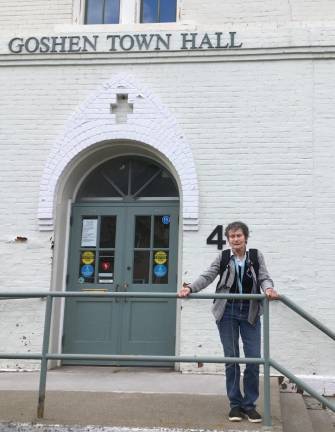
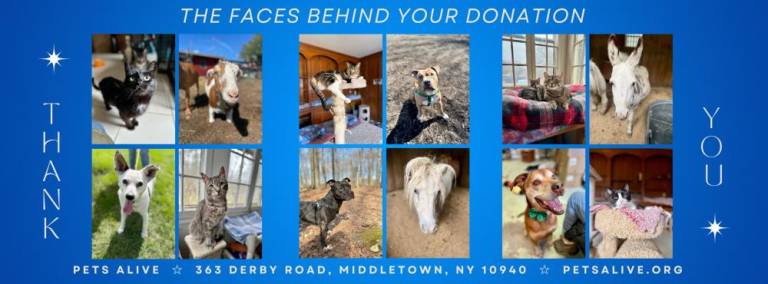
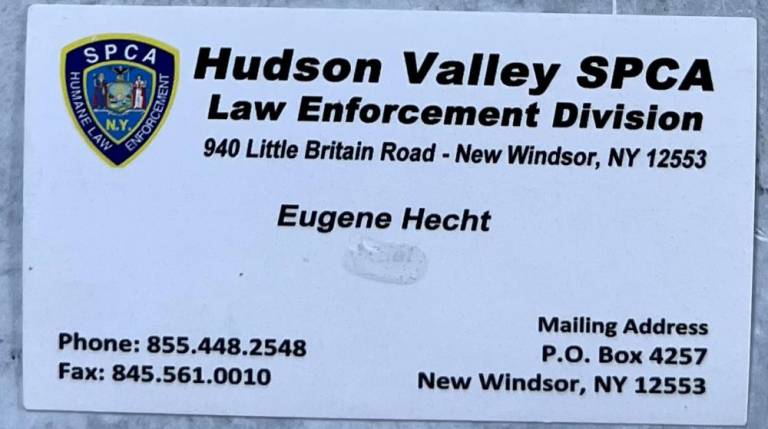
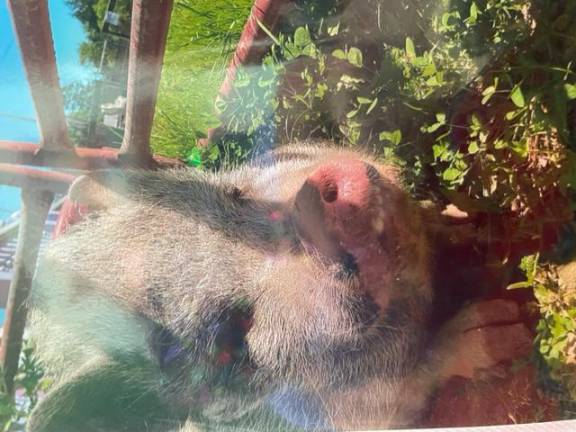
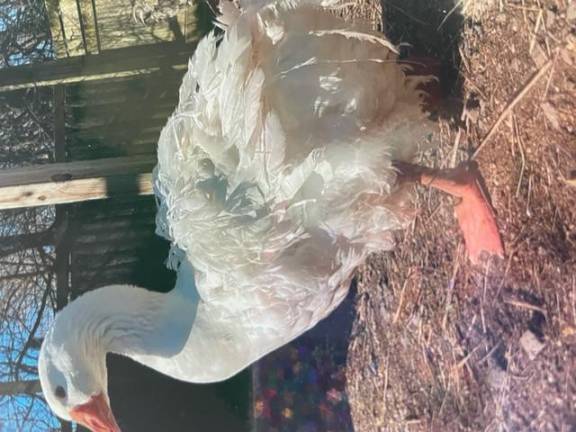
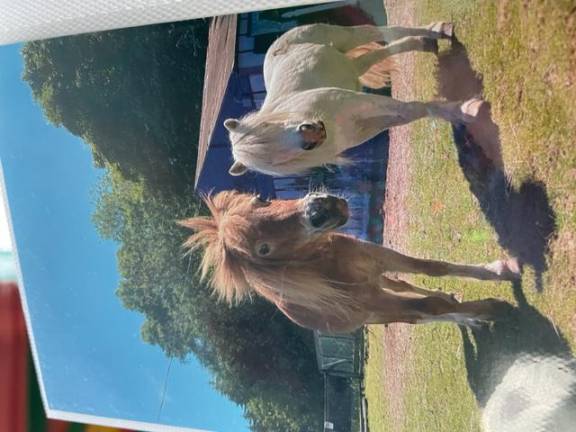
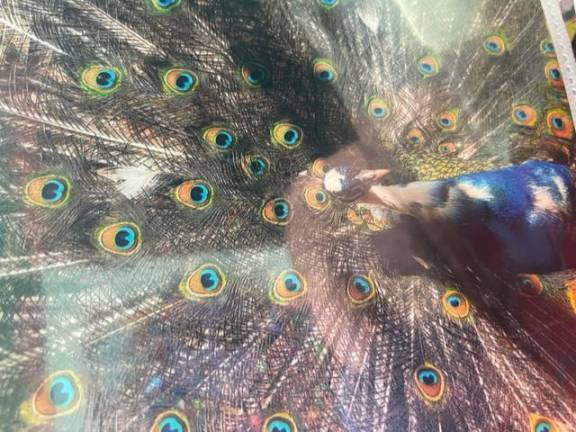
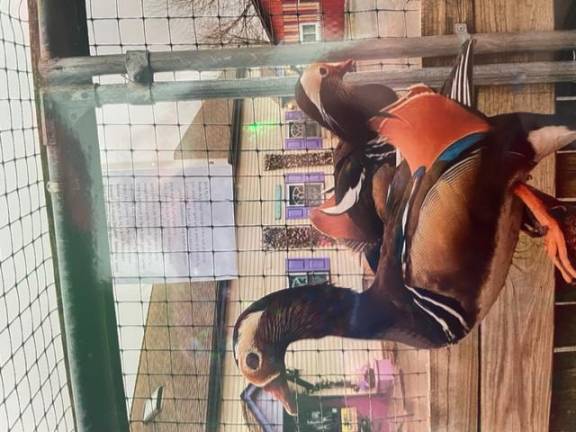
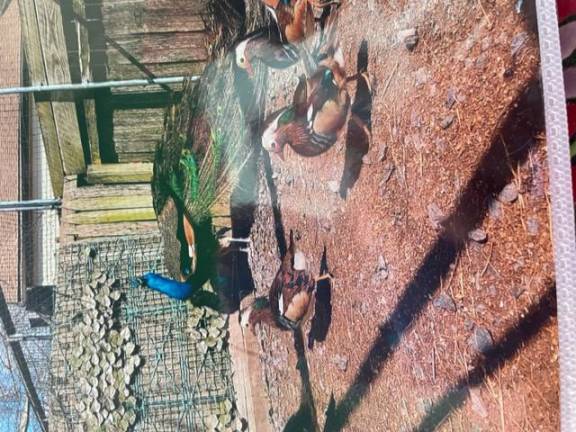
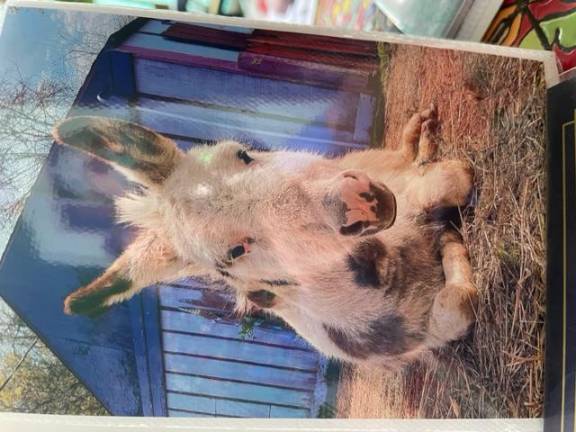
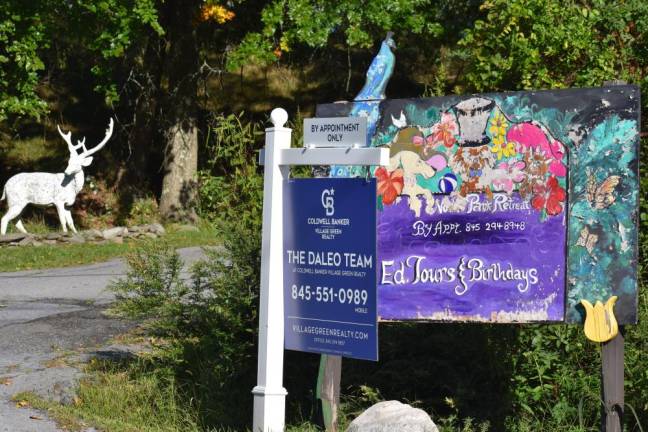
Seven months after the seizure of dozens of allegedly neglected animals from Noah’s Park Retreat in the Town of Goshen, the case against one co-owner was dismissed on April 17. But Rebecca Vives, 82, a cancer patient who requires oxygen to breathe and has a single lung, is afraid it’s too late to be reunited with her animals.
This story began about a year ago with two runaway wallabies, which grabbed headlines after bolting from Noah’s Park. That was followed by criminal animal abuse charges against Vives and Diana McGowan, who together run the nonprofit park, and the removal of most of their animals, including pigs, peacocks, chickens, a Sebastopol goose, guinea hens, sheep, miniature horses, a donkey and mandarin ducks that they had hatched out of an incubator.
Goshen Town Justice Amanda Brady threw out Vives’ case for failure to provide a speedy trial.
But it will cost the women $16,000 to recover the animals that are at the core of their lives. “I don’t have $16,000,” said Vives, who is living on Social Security and has been in and out of foreclosure for years. “I am so broke. Our refrigerator’s almost empty. I pay for the animals first.”
The investigator: ‘Can’t speak about that, no’
The investigator who brought the charges is a convicted felon for an old car fraud conviction, who years later created his own position as chief humane law enforcement officer for the Hudson Valley SPCA. Eugene Hecht, 80, carries a gun and, by his own admission, has more prosecutorial authority than municipal cops. “When it comes to animals, we have even greater power than police. We can prosecute without police,” said Hecht.
Hecht requested the search and seizure warrant after investigating Noah’s Park on an anonymous tip, he said. Someone “saw some animals and said they look terrible, so they called me,” he said. How he gets paid is unknown.
Hecht would not discuss how much he makes or whether there is any link between his salary and the animals he seizes. “Can’t speak about that, no,” he said on April 26.
The plea: Not guilty
Vives and McGowan pleaded not guilty. The case against McGowan, 79, is still active because of a Kafkaesque muddle related to dates. It is essentially the same case. McGowan’s next appearance in Goshen Town Court is May 15.
Reached on April 18, Hecht said it was news to him that Vives’ case had been dismissed, but was driving and couldn’t talk. “I don’t know anything about that,” said Hecht, of the five-month delay between Vives’ first court appearance and trial. “That’s the district attorney’s office. It’s not me.”
Likewise, if and how the Noah’s Park owners could get their animals back was a question for the district attorney, he said.
“I have no idea. I only turn my paperwork into the DA’s office,” he said.
“We are still exploring our options as pertains to the case,” said Assistant D.A. Ryan Greenbaum. “I can’t tell you yet what the outcome will be as it pertains to restitution, or about the animals themselves, and how and if they’ll get returned. We are still working through those issues.”
Tours to schools and families
Noah’s Park, an educational nonprofit co-owned by Vives and McGowan, used to bring in a little income by giving tours to school and family groups, and hosting nature-based workshops on the 7.3-acre property. “We had the educational program here for people to come and you know, see the animals and support the organization, and we lost that. It wasn’t a huge amount of money, but it was adequate,” said McGowan.
Her case getting dismissed feels like a hollow victory, said Vives, since McGowan’s case is ongoing and regardless of the result, they can’t simply reopen her doors. “What animals am I going to show? I only have a pair of emus and my Highland cattle,” she said.
“You know, you lose your purpose in life,” said McGowan, reached by phone. “Is this the way Rebecca’s life is going to end? I mean, we weren’t going to be here that much longer anyway.”
A $16,000 bill
Seven months after the confiscation, 21 people had contributed a total of $2,420 to a GoFundMe campaign for Noah’s Park, the lion’s share coming in the week after the seizure.
When they heard the $16,000 number come out of the judge’s mouth, said McGowan, “everybody’s mouth fell open.”
It was doubly strange, said Vives, since her case had not yet been dismissed. “They offered me the animals back if I had $16,000,” she said. “If I’d abused my animals, why would they be offering them back to me?”
“No, I am not going to pay that – for what?” said McGowan. “What did I do? Absolutely not. It might go to trial, I guess, because I’m not going to be signing off on any admission of guilt of any type. I feel that I was really made a victim.”
Defense attorney: ‘A financial incentive to delay the case’
“Those fees, that room and board, accrues every day. So they have a financial incentive to delay this case, and make more money off my clients – or make it impossible for them to get their animals back, because the fees are now way above and beyond their means,” said Stephen Mullkoff, a New York City-based criminal defense attorney who is representing the Noah’s Park owners pro-bono.
The seizure
On the morning of Sunday, Sept. 11, 2022, Hecht arrived at Noah’s Park with a warrant, accompanied by a caravan of pickups and trailers and escorted by the Goshen Town Police, and began rounding up animals.
“Showing up here – having a convoy of all these trucks coming here, it was like we were invaded,” said McGowan. She told Vives, who is increasingly frail, to stay inside while she went out to see what was going on.
Among the animals taken were a pair of miniature horses. “I paid $3,000 for the mother. It’s not like I bought cheap horses; they had papers and everything,” said Vives.
Vives called Mullkoff, who rushed up from the city to Goshen. Mullkoff has adopted three dogs from Vives and McGowan over the years. The lawyer arrived to find about nine people surrounding a shaggy West Highland cow named Blondie. Because of her size, she was the most difficult to move.
Hecht got on the phone with his own lawyer, and as a result of that conversation, ended up leaving the cow.
“Because I was there, he gets his attorney on the phone and everything changes,” said Mullkoff. “Investigator Hecht intended to seize that cow, even though the cow was perfectly healthy and well fed. Which is the same actions he took on all the other animals.
“I was there two weeks prior,” Mullkof added. “We saw every animal. There wasn’t a single animal malnourished, sick. Somehow, magically, this guy comes and seizes and the whole property.”
‘A Pygmalion effect’
How Hecht came to be in such a power position, and why he is so aggressive in seizing animals, are questions that this reporter has heard before. Another source who’s had dealings with Hecht who asked for anonymity said, “It’s like he has a Pygmalion effect, as if he is the end all be all in authority and can distribute his supposed control to anyone he decides,” said that source.
Does he ever think about retirement, at age 80?
“No, no, no,” said Hecht. “I love animals. We’re the voice for them. If we didn’t do it, nobody would do it.”
Pets Alive
The bigger animals were taken to Pets Alive in Middletown, which provided the transport vehicles and accompanied the mission. When we spoke to Becky Tegze, the shelter’s executive director in September she explained that “we emergency housed the pigs before they were transferred to another rescue. I have two sheep, two mini horses and a mini donkey,” said Tegze in September.
The pigs were taken at Two by Two Animal Haven in Pleasant Valley in Dutchess County, which did not return an email by press time.The others would remain at Pets Alive while the case is ongoing, Tegze said in September.
Pets Alive works closely with humane law and the sheriff’s department, said Tegze. “We ourselves are not the ones confiscating. We are a housing facility for law enforcement.”
Hecht said on April 26 he believes the animals are still at Pets Alive, including the donkey, “as far as I know,” he said.
Tegze could not be reached by press time; her email auto-reply said she was out of the office until May 2.
Freckles the donkey
One of the confiscated animals, Freckles, the donkey, has apparently been used to raise funds for Pets Alive, the Middletown shelter where the larger animals were taken.
Freckles came to Noah’s Park about a dozen years ago when his owner, who ran a similar operation on Long Island, could no longer care for him. The spotted miniature donkey became the main attraction, grazing alongside toddlers in photos, featuring in Make-a-Wish events and appearing onstage in a Nativity scene.
After the seizure, Freckles was described on the Pets Alive’s Facebook page as “rescued from a neglectful situation” above a link to donate “to help us save more barn animals like Freckles.” Eventually, he was advertised for adoption, “to a home that will give him the proper medical care and consistency he needs to live a comfortable and happy life!”
“It quickly became clear to our staff that he was hit at some point in his life,” said another post. “Freckles is always a little shy with new people, but he even flinches when his caregivers first pet him.”
“Freckles has Cushing’s Disease, an endocrine condition that leads to chronic infection, laminitis and broken bones, ligament degeneration, type-2 diabetes, kidney stones, high blood pressure, and more,” said another post. “We don’t know how long his condition was left untreated, but we’re so glad that daily medications and close monitoring control his pain and fight the long-term effects of his condition.”
Vives said she was angered by the accusation. “They’re saying what a sweet donkey he is. And he didn’t get it from being with them. He got it from being with us,” said Vives.
The accusations of abuse, said McGowan, are “ridiculous. Those animals were shown to the public all the time,” she said. “He loved people, he was extremely friendly in general,” she said of Freckles. “I find these people very dishonest.”
The smaller animals, like the chickens and guinea hens, were taken to a farm in Clintondale in Ulster County, said Hecht in September.
“I’m a nurturing person with the animals. So I’d get eggs from eBay and I’d hatch them out. I had hatched out five out of six mandarin ducks: four males, one female. And they took them,” said Vives. “They wanted those mandarin ducks because they’re rare,” she speculated. A mandarin duckling costs $112.50 from Murray McMurray Hatchery, the world’s largest rare breed hatchery and they are sold out.
An anonymous complaint
Hecht investigated Noah’s Park after receiving an anonymous complaint, he said in September. Based on what he observed, Hecht requested a search warrant and seizure order, which was signed by Town of Goshen Justice Amanda Brady on Sept. 8.
Not knowing who called on them has cast a long shadow over the two women, prompting their suspicions to stray along a variety of channels, fearful of letting anyone on the property.
Vives says that on the day Hecht made his inspection, he arrived around 9:30 a.m. and began talking to the young woman who was about to make her rounds, keeping her from her chores that included feeding and watering the animals. Meanwhile, Hecht took pictures of the animals’ empty food and water dishes.
Before the seizure, two employees took care of the Noah’s Park animals seven days a week. Now they are down to one employee; the other found a job elsewhere as finances tightened, she said.
The Hudson Valley SPCA
Unlike police officers, Orange County’s humane law enforcement officers are not public servants. “We don’t get a dime from taxpayers,” said Hecht. The Hudson Valley SPCA employs six investigators including himself, he said. But it is not clear how much they are paid, or where that money comes from.
The Hudson Valley SPCA is tricky to pin down, because it is doing business as the Newburgh Society for the Prevention of Cruelty to Animals. Gene Hecht joined the Newburgh SCPA as one of nine directors in 2010.
The next year, the organization’s mission – the care of and prevention of cruelty to animals – expanded to include humane law enforcement. His wife, Jan Hecht, came aboard as treasurer in 2016, according to the organization’s 990 form. That year, Gene moved up to his current role as secretary of the Newburgh SPCA, a job on which he spends about 10 hours a week, according to the IRS document.
The Newburgh SCPA employed 10 people in 2019 and brought in $433,792, the lion’s share from donations and grants from the likes of the Community Foundation of Orange and Sullivan, the Ralph E. Ogden Foundation and the Humane Society of Monroe, which donated $1,500 in 2020 for “support for the care of animals.” The remaining five percent of the nonprofit’s income – $21,305 – came from adoption revenue. Adoption revenue has increased more than eleven-fold since 2014.
None of the SCPA’s key people are paid an on-the-books salary. President Joan Kay, Vice President Paul Teutul Sr. – better known for the reality TV show featuring his Orange County Choppers – and Jan and Gene Hecht all make $0, according to their 990 form. That’s a change that occurred in 2011; before that, the organization employed an executive director who drew a salary.
The Newburgh SPCA spent $40,535 on veterinary fees in 2019, and more than four times that on “other salaries and wages.”
The $163,996 in un-itemized salaries accounts for 43 percent of the organization’s total expenses.
That line item jumped $65,666 the year Hecht came onboard, and has fluctuated since, trending upward, as general public support for the Newburgh SPCA has fallen more than 40 percent since 2015.
The Newburgh SPCA did not return calls by press time.
The Hudson Valley SPCA did not acknowledge receipt of a Freedom of Information Law request for information regarding donations and Hecht’s salary.
Troubles mounting
In the wake of the well-publicized wallaby escape last spring, the U.S. Department of Agriculture inspector cited Noah’s Park for exposed mesh, insufficient space between enclosures and lack of a required perimeter fence around the property, which contributed to the wallabies’ escape.
“We were devastated, the wallabies going missing,” said McGowan. “But stuff happens. It happens even to big well-funded organizations like these zoos, and the kid falls into the gorilla pit. I mean, it happens.”
Earlier violations include rusty or jagged wire in animal enclosures; unsanitary food prep and storage areas; insufficient record-keeping; and housing marmosets, a kinkajou, cavies and paca in an insufficiently ventilated basement without functioning windows.
A Kafkaesque muddle
Vives, for whom travel with her oxygen tank is onerous, showed up at court on the date specified on her ticket, to find that her name wasn’t on the docket at all – not for that day or any other. Then in February, a second pair of tickets signed by Hecht appeared in the mailbox at Noah’s Park, one each for Vives and McGowan, for the same offense but with different dates.
Mullkoff believes that in issuing the second pair of tickets, Hecht was attempting to reset the clock. “It’s dirty, dirty, dirty. He has no business being a law enforcement officer because he’s abusing his authority,” said Mullkoff. “Now that he waited so long, deliberately, it’s impossible” for his clients to pay the bill to get their animals back.
The difference in McGowan’s case is that the date of her initial summons turned out to be Veterans Day, so when she showed up at court it was closed.
Mullkoff plans to file a motion to renew his arguments to dismiss in McGowan’s case.
The vision
Noah’s Park opened decades ago as a boarding and grooming business. As they took in pets whose owners couldn’t keep them, it evolved into an educational nonprofit that hosted school groups and kids’ birthday parties.
“We were never really into it for the money. We thought we were doing a good thing for the community. And then there are people who didn’t like it, apparently.”
Vives has chronic obstructive pulmonary disorder in her remaining lung, a terminal diagnosis.
“I wanted to spend my last days doing what I’ve been doing, for as long as I could.”